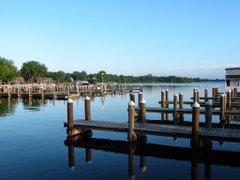I have had the pleasure of serving as the Lake Minnetonka Association Executive Director for over 10 years. In that time, I have heard several consistent concerns from lakeshore owners, the people we represent. I have also heard several consistent myths about lakeshore owners. Over the next few months, I will present these in hopes of better understanding by all.
The most common complaint I get is about milfoil in Lake Minnetonka – lakeshore owners and most lake users do not like it.
Yes, sometimes lakeshore owners cast blame on boaters for bringing milfoil into the lake, but this is out of ongoing frustration that boaters continue to bring in aquatic invasive species (AIS), most recently zebra mussels. We understand that in the late-1980s when milfoil was brought in, there was poor awareness that this could be a problem (unlike now) and that milfoil was certainly not introduced intentionally.
Lakeshore owners are impacted by milfoil almost every day during the summer. It grows in dense mats near the shore, impeding our access to the lake. Wind, boats and harvesters cut it up and spread it, then it washes to our shores where we have to clean it up. I have heard accounts of lakeshore owners picking up dozens of wheelbarrows-full of milfoil after weekends.
We like the bay-wide milfoil treatments. Indeed, the lakeshore owners on the participating bays have paid the bulk of the treatment costs. While they have done so willingly, they do not understand why the agencies responsible for regulating and managing our lake do not pay more (maybe all) of the costs – it often rings hollow when on one hand we are told this is a public lake, but then on the other hand told it is our responsibility to pay for cleaning it up. While the Lake Minnetonka Conservation District supports this project, it has been through grants from their Save-the-Lake Fund, established from private contributions.
We are not concerned about the use of chemical herbicides to control milfoil. If these chemicals are approved for use by the U.S. Environmental Protection Agency and permitted by the Minnesota Department of Natural Resources, that is, by and large, okay by us. We get frustrated and impatient with individuals and agencies who suggest these are harmful when they have neither the capacity, expertise nor the authority to regulate these management tools. The harvesters kill fish – the herbicides do not.
We do not like the harvesters. What relief they provide for navigation is minimal and short-lived. The harvesting season, by necessity, begins when milfoil is high enough to cut (late-June); however the boating season slows down significantly after the Fourth of July. As well, the milfoil fragments generated by the harvesters are not all collected – so they float to our shores.
We would like to see and would probably support a comprehensive milfoil control plan for the lake.
We do not understand the rules for weed control. The mantra of our public agencies is that milfoil is bad for lakes; however once it gets in, we are restricted how we can control it. We understand that native plants are important for the health of the lake, but we also understand milfoil left unmanaged, harms the lake’s health. The rules for managing milfoil ought to encourage its control while at the same time protecting other, good plants. The bay-wide program is a good step toward this – we would like to see this available for the whole lake.
There are too many agencies involved in managing or regulating milfoil. The LMCD which now manages the harvesters, has funding constraints and lacks technical expertise. The Minnehaha Creek Watershed District has substantial financial resources, credible expertise and the mission to protect the health of our waters, yet they are not directly involved in managing milfoil. Invasive plant management responsibilities ought to be vested in the MCWD.
Lakeshore owners on Lake Minnetonka love this lake and want it clean and healthy for all to enjoy.
Future topics – agencies, rules and regulations, docks and boating and water quality.
Saturday, March 12, 2011
Subscribe to:
Post Comments (Atom)


1 comment:
Dick, I just found your blog site. Excellent content. Thanks for providing good information about the ongoing challenges and battle with keeping our lakes in good condition so that people can enjoy them.
Post a Comment